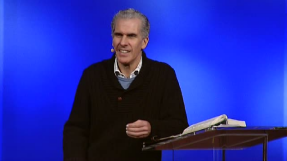
I have a secret and sophisticated evangelistic technique. In Acts 8:4, it says that they talked about Jesus wherever they went. When we think of evangelism, we think of sermons, crusades and events. But in Acts, more often than not the gospel spread through relationships. So, my secret is: talk about Jesus wherever you go.
But how do we do evangelism in relationships? Talking to our family, friends and work colleagues seems simple in theory, but why is it so often a challenge in practice?
If we look at Ephesians 6 – one reason is that it's a spiritual battle. Satan doesn't want people to hear the gospel, or accept it, or share it with anyone else. The devil's biggest plan for your life is that you would be a private Christian. There is a spiritual resistance to overcome.
There is also social pressure, in Britain and Western Europe, to keep our faith private. In the UK, with a massive Christian heritage, why is there so much pressure not to talk about our faith? Such ideas, we're told, are at best outdated and exclusive and at worst irrational and divisive. We feel pressure to keep our faith to ourselves.
There is also an inner instinct of self-preservation – the fear of being rejected, of offending, of being misunderstood, or being thought of as strange. There is an underlying fear that God is not going to show up.
In other words, the challenges we face in talking about Jesus with our friends are: the world, the flesh and the devil.
Evangelism to our friends and relatives is about being genuinely interested in other people. If you like people, this is going to be a good one for you. William Wilberforce was said to be genuinely interested in people, so people opened up to him. How do people generally respond if you're interested in them? They ask you questions about you, too. So that can be our invitation to talk about our faith.

Think about the Scripture from 1 Peter 3:15: "Always be prepared to give an answer to everyone who asks you to give the reason for the hope that you have. But do this with gentleness and respect." The word translated as 'answer' is 'apologia' – the same word used by a defence lawyer in a court of law. We should be giving reasons, and be willing to engage in difficult questions. Pascal said that our role is to make people wish that the gospel were true, and then show them that it is. So, telling the gospel is important, but so is being able to deal with any questions that come up.
We should be able to answer questions such as: How do we know Jesus existed? How do we know God exists if we can't see him? Hasn't science disproved all of this? If you don't know how to respond to someone's question, tell them you're going to think about it, and do some research. You may not know all the answers, but the best way to learn and grow and is to talk to people about Jesus.
Simon Edwards is an Apologist for RZIM and Assistant Chaplain of the Oxford Centre for Christian Apologetics.


















